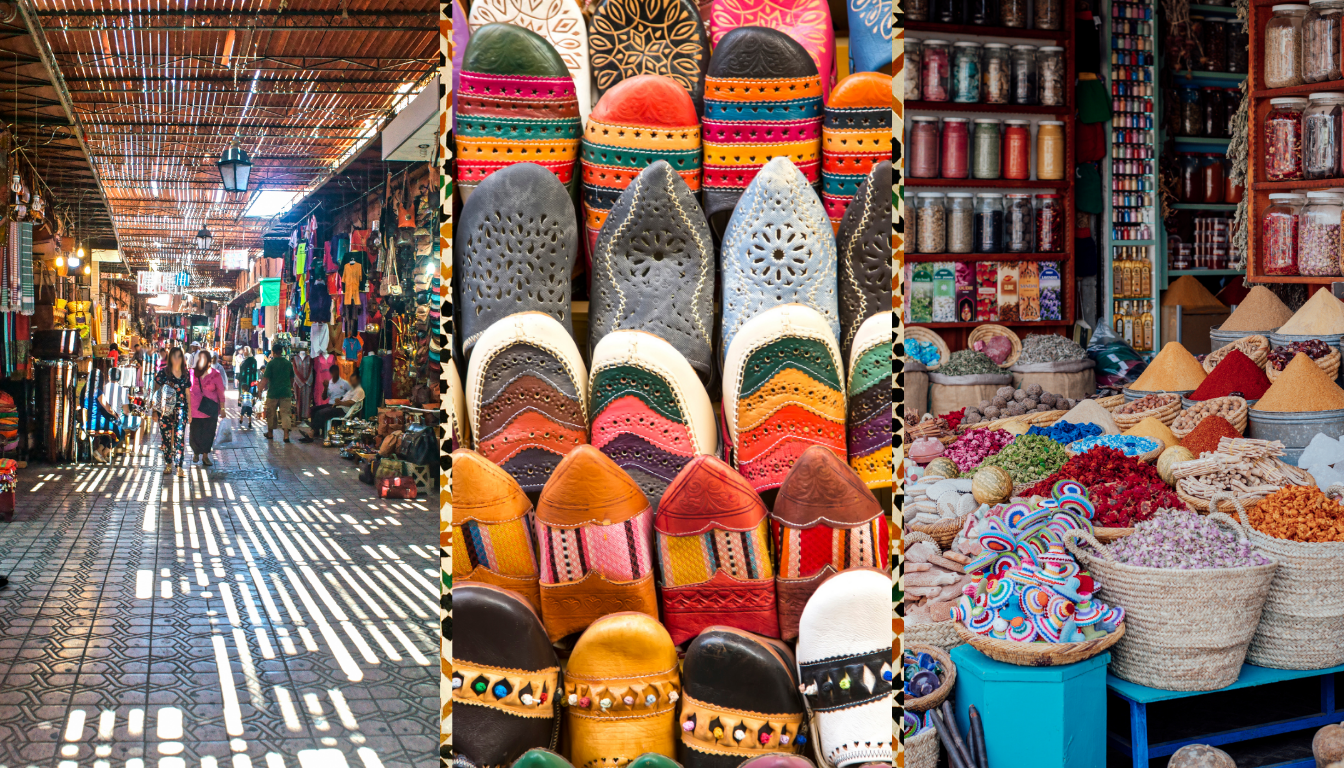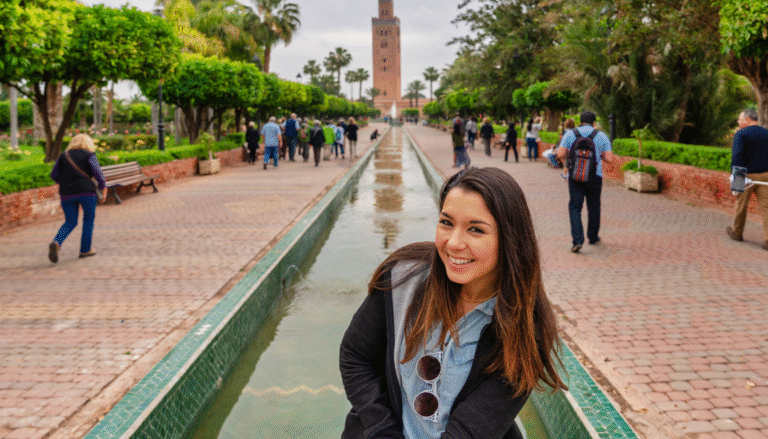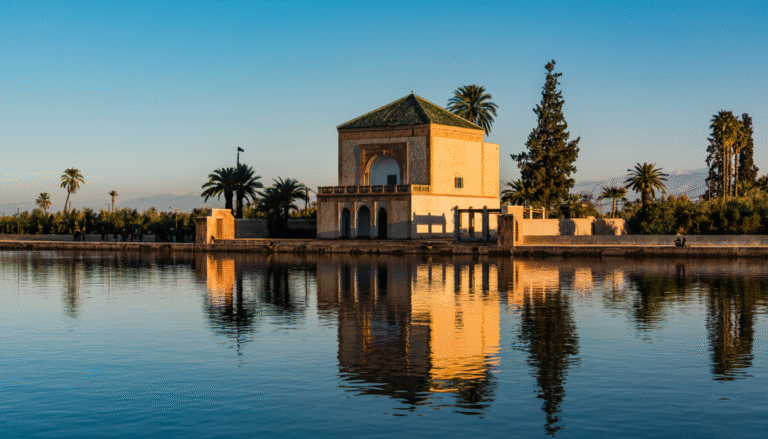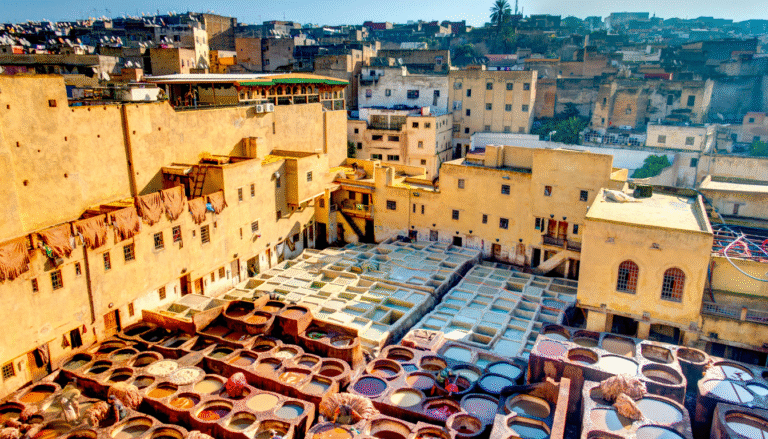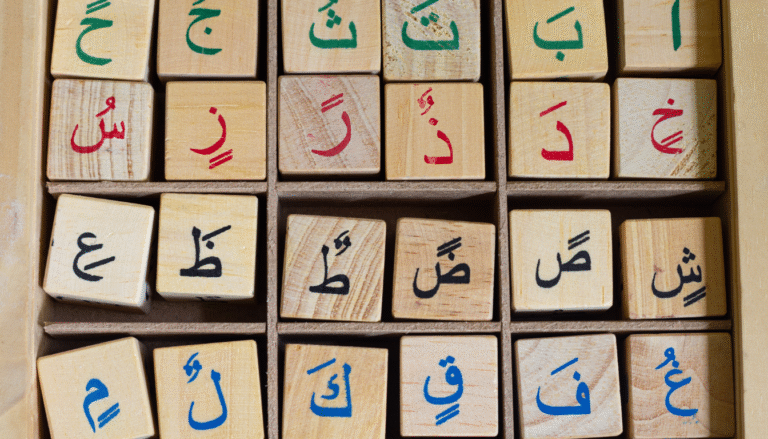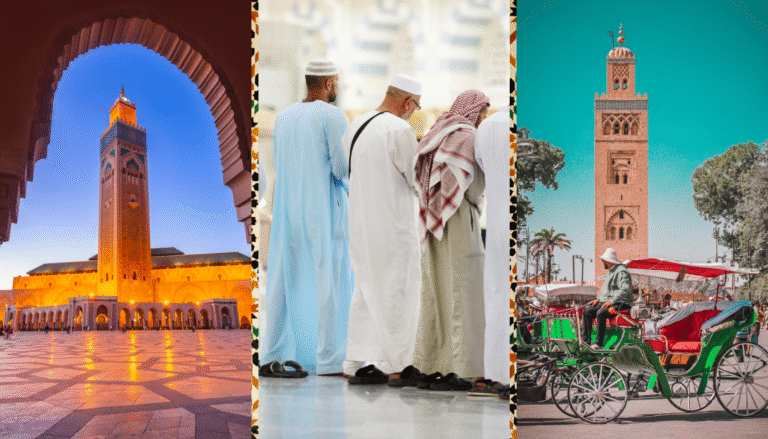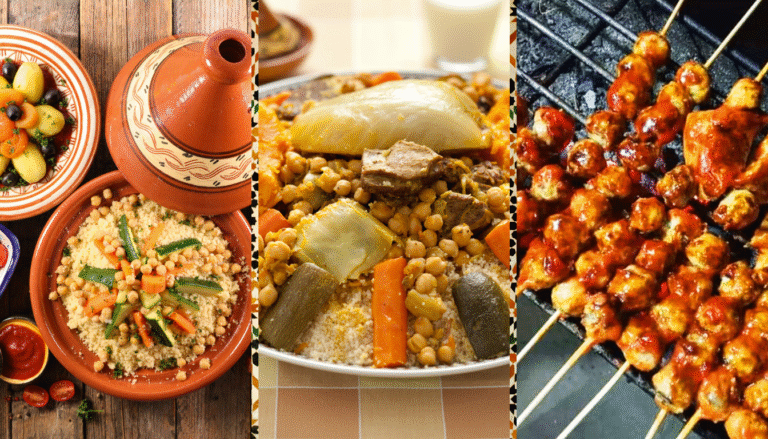Ultimate Guide to Souk Shopping in Morocco: What to Buy & How to Haggle
Imagine walking through vibrant markets, surrounded by the enticing aromas of spices and the rich cultural heritage of Morocco. Millions of tourists visit these traditional souks every year for authentic Souk Shopping. You’re about to experience one of the most immersive cultural experiences.
As you navigate the bustling alleys, you’ll find unique souvenirs from Morocco that reflect the country’s rich history and craftsmanship. You’ll learn how to find the best Moroccan souvenirs and master the art of haggling like a local. From intricately designed tiles to fragrant spices, there’s something for everyone.
Get ready to embark on an unforgettable journey through the enchanting world of souks. Vibrant colors and enticing aromas await you. You’ll be equipped with the knowledge to make the most of your souk experience.
The Enchanting World of Moroccan Souks
Stepping into Moroccan souks is like entering a world of sights, sounds, and smells. These markets are more than places to shop. They are lively centers of culture, history, and community.
What Are Souks and Their Cultural Significance
Souks are traditional markets that have been key to North Africa’s trade for centuries. They are not just for shopping. They are a big part of Moroccan life, filled with trade and social events.
The History of Trading in North Africa
Trading in North Africa has a long history, with souks at its heart. These markets were key in the ancient trade of goods and ideas. The trans-Saharan trade routes, for example, brought valuable items like gold and salt, enriching the area’s culture and economy.
The Sensory Experience: Sights, Sounds, and Smells
Exploring a souk is a unique experience. The air is filled with the scent of spices and the sound of merchants. You’ll see colorful textiles and handicrafts everywhere. Walking through the narrow alleys, you’ll find everything from leather bags to beautiful pottery.
| Sensory Element | Description |
|---|---|
| Sights | Vibrant textiles, handicrafts, and colorful market stalls |
| Sounds | Merchants calling out, haggling, and lively chatter |
| Smells | Aromatic spices, fresh mint, and traditional Moroccan cuisine |
Understanding the Layout of Traditional Markets
The alleys of Morocco’s souks can seem overwhelming at first. But, knowing how they’re laid out can lead you to amazing finds. Souks are the core of Moroccan commerce and culture, offering a unique sensory experience.
How Souks Are Organized by Trade
Moroccan souks are set up by the goods sold. You’ll find areas for spices, textiles, metalwork, and more. For example, Marrakech’s souk is famous for its handmade crafts in Marrakech. These include stunning jewelry, vibrant textiles, and detailed wooden items.
Best Times to Visit for Authentic Experiences
Timing is key for a real experience at the best souks in Morocco. Visit early morning or late afternoon to dodge the crowds and heat. This makes your souk shopping in Morocco trip more fun.
Navigating the Labyrinthine Alleys
Exploring the souk’s narrow alleys is part of the fun. Here are some tips to help you navigate:
| Tip | Description |
|---|---|
| Get a Map | A map can help you grasp the souk’s layout. |
| Ask Locals | Moroccans are friendly; ask them for directions. |
| Explore Slowly | Take your time to discover hidden gems in the alleys. |
By understanding the souks’ layout and being prepared, you’ll confidently explore these markets. You’ll get the most out of your souk shopping in Morocco adventure.
Essential Preparations Before Your Souk Adventure
Before you start your Moroccan souk adventure, get ready. A traveler who prepares well will enjoy their shopping more.
What to Wear and Bring
When visiting souks, dress modestly. Wear loose, comfy clothes that cover your shoulders and knees. Comfortable shoes are a must for walking on uneven paths. A scarf or shawl is handy for covering up or as a stylish piece.
Arabic Phrases for Shopping
Learning basic Arabic phrases can make your shopping better. Say “Shukraan” (thank you) and “As-salamu alaykum” (peace be upon you). These phrases show respect and might get you better deals.
Setting Your Budget and Cash Considerations
Set a budget before you shop. Souks can be overwhelming, and it’s easy to overspend. Most vendors want cash, so have local currency ready. Credit cards aren’t always accepted.
Using Maps and Meeting Points
Navigating souks can be tough. Use a map or agree on a meeting spot with your group. Souks are complex, and it’s easy to lose your way. Study the map and know key landmarks before you start.
| Preparation | Tips |
|---|---|
| Dressing | Modest and comfortable clothing, covering shoulders and knees |
| Arabic Phrases | Learn basic phrases like “Shukraan” and “As-salamu alaykum” |
| Budgeting | Set a budget, prefer cash, and know that credit cards might not be accepted |
| Navigation | Use maps, identify landmarks, and agree on meeting points |
Treasures to Hunt: What to Buy in Moroccan Souks
As you explore the lively alleys of Moroccan souks, you’ll find a wealth of unique souvenirs. These souvenirs showcase the country’s rich culture. The souks are a shopper’s dream, filled with authentic goods for all tastes and budgets.
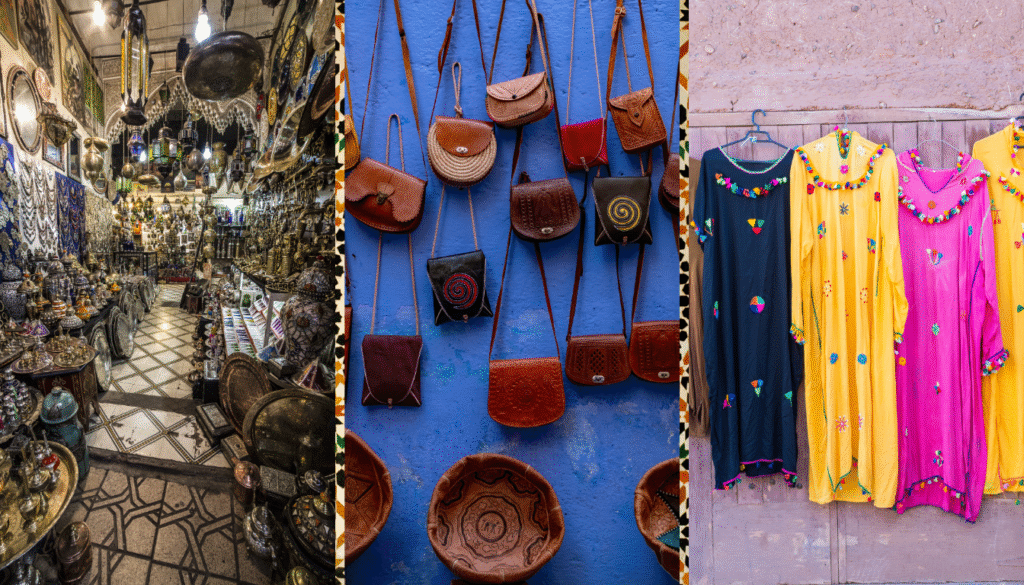
Textiles: Carpets, Blankets, and Clothing
Moroccan textiles stand out for their bright colors and detailed patterns. You can find stunning carpets, cozy blankets, and traditional outfits like djellabas and kaftans. These items are great souvenirs or gifts, showing off Moroccan craftsmanship.
Tips for Buying Textiles: Opt for handwoven items for better quality. Make sure the material is durable, like wool or silk. Remember, bargaining is part of the fun, so be ready to negotiate.
Leather Goods: Bags, Poufs, and Footwear
Morocco is known for its leather products, from stylish bags and poufs to comfy shoes. The souks have a wide variety of leather items, often made with old techniques.
- Check the quality of the leather and the craftsmanship.
- Consider the versatility of the item; can it be used in multiple settings?
- Don’t be afraid to haggle; it’s all part of the shopping experience.
Ceramics and Pottery: Tagines and Decorative Items
Moroccan ceramics and pottery are both useful and decorative. Items like tagines, plates, and vases are made with stunning designs and colors. They’re perfect souvenirs.
Spices, Teas, and Culinary Treasures
For cooking enthusiasts, Moroccan souks have a lot to offer. You can find exotic spices, aromatic teas, and gourmet products that bring Morocco’s flavors home.
| Spice/Tea | Description | Price Range |
|---|---|---|
| Ras el hanout | A blend of spices, often including cinnamon, cumin, and coriander. | $5-$10 |
| Moroccan Mint Tea | A refreshing tea made with green tea and fresh mint leaves. | $3-$6 |
Metalwork, Lamps, and Home Décor
Moroccan metalwork is famous for its detailed designs and skill. Items like lanterns, lamps, and decorative trays can bring Moroccan style to your home.
Tip: Look for items with intricate details and consider how they might fit with your home decor.
Natural Cosmetics: Argan Oil and Beauty Products
Argan oil is a popular Moroccan product, known for its moisturizing benefits. You can find beauty products with argan oil, from skincare to haircare.
Benefits of Argan Oil: Hydrates the skin, reduces fine lines, and nourishes hair.
The Art of Haggling: Step-by-Step Negotiation Guide
In Morocco’s bustling souks, haggling is key to getting a good deal. It’s a big part of the shopping culture. Visitors can learn to enjoy it.
Understanding the Starting Price vs. Fair Value
When you enter a souk, prices are often up for negotiation. Knowing the difference between the starting price and fair value is crucial. The starting price is higher, while the fair value is what both sides can agree on.
Doing your research on fair values before shopping can help a lot.
The Haggling Process: Opening, Countering, and Closing
Haggling involves several steps: opening, countering, and closing. It starts with the vendor’s initial price. You then offer a lower price, and the negotiation goes back and forth until you agree.
Effective Phrases and Body Language
Using the right phrases and body language can improve your haggling. Saying “As-salamu alaykum” (peace be upon you) can set a positive tone. Keeping a friendly demeanor can also help the negotiation flow smoothly.
When to Walk Away and When to Close the Deal
Knowing when to walk away is important. If the price isn’t right, walking away might prompt a lower offer. But, be ready to actually leave if the deal isn’t good enough.
On the other hand, if the vendor seems ready to accept your offer, it’s time to close the deal.
Haggling Etiquette: Keeping It Friendly
Keeping a friendly and respectful attitude is crucial. Avoid being aggressive or confrontational. A smile and a positive attitude can make a big difference.
Mastering haggling can make your souk shopping in Morocco more rewarding. It can make your visit memorable and enjoyable.
Souk Shopping in Morocco: Cultural Etiquette and Customs
To fully enjoy souk shopping, knowing the local customs is key. These traditional markets in Marrakech and other places have their own rules. By understanding and respecting these customs, your visit will be more rewarding.
Respectful Interactions with Vendors
Being polite and respectful is crucial when talking to vendors in Morocco’s souks. Saying “hello” or “as-salamu alaykum” (peace be upon you) is a good start. Vendors often like to share stories about their products and the local culture.
Photography Rules and Permissions
Always ask for permission before taking photos in the souks. Some vendors might not want their goods or workspace photographed. It’s important to respect their wishes to avoid any issues.
Accepting Hospitality: Tea Ceremonies and Conversation
If a vendor invites you for tea, it’s a sign of respect. Accepting can lead to interesting conversations and a better understanding of the local culture. Be ready to chat and appreciate the tea and company.
Gender Considerations While Shopping
Be aware of gender norms and customs in the souks. In some places, men and women may shop separately or have different expectations. Showing respect for these differences can make your shopping experience smoother.
| Cultural Etiquette Tip | Description | Benefit |
|---|---|---|
| Greet vendors respectfully | Use phrases like “as-salamu alaykum” | Sets a positive tone for interaction |
| Ask permission for photos | Respect vendors’ privacy and goods | Avoids misunderstandings and shows respect |
| Accept hospitality graciously | Engage in conversation and appreciate tea | Leads to meaningful interactions and cultural understanding |
Must-Visit Souks Across Morocco
Morocco’s souks are a treasure trove of cultural experiences. From Marrakech’s bustling alleys to Chefchaouen’s serene markets, you’ll find a world where tradition and craftsmanship come alive.
Marrakech’s Medina and Jemaa el-Fnaa
Marrakech’s Medina is a must-visit for souk enthusiasts. The famous Jemaa el-Fnaa square is a sensory overload. You’ll see snake charmers, street performers, and food stalls.
As you explore the narrow alleys, you’ll find colorful textiles and intricate jewelry. It’s a shopper’s paradise.
Top picks in Marrakech include:
- Rahmouna for beautiful traditional Moroccan clothing
- Souk Semmarine for an array of handmade crafts
- Cafe de France for a taste of local cuisine
Fez’s Ancient Marketplaces
Fez is home to some of Morocco’s oldest and most historic souks. The ancient marketplaces are a labyrinth of narrow streets. You’ll smell cedar wood and hear artisans at work.
Notable mentions in Fez:
- The Souk el Attarine, or Perfume Souk, where you can find unique fragrances
- The Kissaria, a textile market with a vast array of fabrics
Essaouira’s Artisan Quarters
Essaouira’s souk is known for its relaxed atmosphere and high-quality crafts. The artisan quarters are a haven for handmade goods. You’ll find intricate woodwork and beautiful textiles.
Chefchaouen’s Blue-Hued Bazaars
Chefchaouen is famous for its blue-painted buildings, and its souks are no exception. The blue-hued bazaars offer a unique shopping experience. They focus on local handicrafts and souvenirs.
Hidden Gems: Lesser-Known Markets
While major souks are a must-visit, explore Morocco’s lesser-known markets too. These hidden gems offer a more local experience. You’ll find unique, handmade items.
Some of the unique souvenirs from Morocco include:
- Handmade Moroccan tiles and ceramics
- Intricately designed leather goods
- Colorful textiles and blankets
As you explore these souks, remember to haggle respectfully. Enjoy the vibrant atmosphere. Morocco’s souks have something for everyone, whether you’re a seasoned shopper or just looking for a unique experience.
Avoiding Common Scams and Ensuring Authenticity
Exploring Morocco’s souks can be exciting, but you need to watch out for scams. It’s important to know how to spot real handmade crafts from fake ones. This way, you can enjoy your shopping without worries.
Recognizing Authentic vs. Factory-Made Products
Look for signs of handmade work to find real Moroccan items. Genuine handmade crafts in Marrakech show the artisan’s touch, making each piece special.
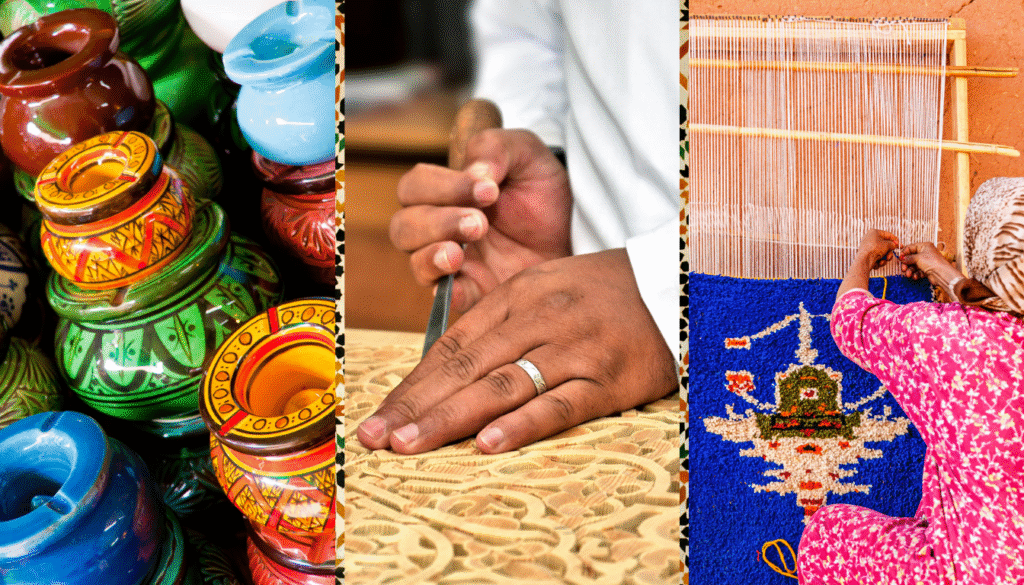
Price Benchmarks for Popular Items
Knowing the right price for Moroccan souvenirs helps you shop smart. Here’s a quick price guide:
| Item | Low-End Price | High-End Price |
|---|---|---|
| Handmade Carpet | $50 | $500 |
| Leather Bag | $20 | $100 |
| Tagine | $10 | $50 |
Dealing with Persistent Vendors and Guides
Being polite but firm is key when vendors or guides won’t take no for an answer. You can say, “I appreciate your offer, but I’m just browsing for now.“
Safety Tips for Your Valuables
Keep your stuff safe by using a money belt and staying alert. Always keep valuables close and think about using a hotel safe.
Shipping, Packing, and Customs Considerations
Understand shipping costs and customs duties before sending your items. Ask vendors about their shipping plans and think about getting insurance.
Conclusion: Bringing Morocco Home with You
As you finish your souk shopping in Morocco, you’ll have more than souvenirs. You’ll have memories of the vibrant culture, warm hospitality, and rich history. This guide has helped you navigate the souks with confidence. Now, your souk shopping in Morocco experience will be both enriching and enjoyable.
Whether you’re a seasoned traveler or new to Morocco, the essence of the country will stay with you. The Moroccan souvenirs you collect will remind you of your adventures. Each one tells a story of the people, places, and experiences that make Morocco special.

